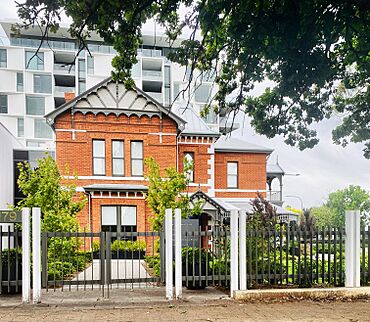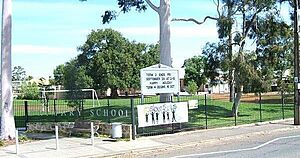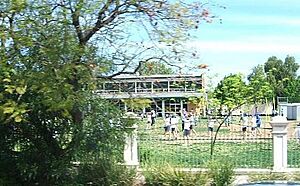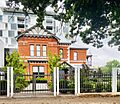Parkside, South Australia facts for kids
Quick facts for kids ParksideAdelaide, South Australia |
|||||||||||||||
|---|---|---|---|---|---|---|---|---|---|---|---|---|---|---|---|

Carramar House
|
|||||||||||||||
| Established | 1849 | ||||||||||||||
| Postcode(s) | 5063 | ||||||||||||||
| Elevation | 55 m (180 ft) | ||||||||||||||
| Area | 1.63 km2 (0.6 sq mi) | ||||||||||||||
| Location | 2.4 km (1 mi) S of Adelaide | ||||||||||||||
| LGA(s) | City of Unley | ||||||||||||||
| State electorate(s) | Unley (2011) | ||||||||||||||
| Federal Division(s) | Adelaide (2011) | ||||||||||||||
|
|||||||||||||||
Parkside is a lively suburb located just south of Adelaide in South Australia. It's part of the City of Unley and is known for its green spaces and friendly community feel.
Contents
A Glimpse into Parkside's Past
Parkside has an interesting history! Long ago, a large part of the suburb was home to a special hospital. This hospital, called 'The Parkside Asylum', was the main place in South Australia for people who needed help with their mental health. It was a very important facility for the state.
The Parkside Post Office first opened its doors on December 10, 1859. Later, in 1967, its name was changed to Eastwood.
Where is Parkside Located?
Parkside sits right next to the beautiful southern park lands. These park lands are like a green belt around the city. The suburb is surrounded by several main roads, including Glen Osmond, Greenhill, Unley, and Fullarton roads.
Parkside's Community Spirit
The local news for Parkside residents comes from the Eastern Courier Messenger newspaper. You can also find bigger newspapers like The Advertiser and The Australian here.
Learning in Parkside
Parkside is home to two schools. Parkside Primary School is located on Robsart Street. Another great school, St Raphael's School, can be found on Glen Osmond Road.
Fun Things to Do in Parkside
There's plenty to explore and enjoy in Parkside!
Shopping and Eating Out
If you love to shop or grab a bite to eat, you're in luck! Parkside is just a short walk from the popular Unley Road area. This street is full of shops and restaurants, perfect for an afternoon out.
Discovering Parkside's Parks
Parkside has some wonderful parks where you can relax and play.
- Howard Florey Reserve is one of the biggest parks. You can find it at the corner of Campbell Road and Fullarton Road.
- Henry Codd Reserve is located between Maud Street and Fuller Street. It even has a walking path that connects to the Leicester Street playground.
- There's also Mcleay Park, which is between George Street and Jaffrey Street.
Many of these parks are fenced, making them safe and fun for younger children. Plus, they all have their own playgrounds!
Entertainment and Arts
Parkside is also home to the Slingsby Theatre Company. This amazing group creates special and heartfelt theatre shows for both adults and young people. They even travel around the world with their performances! You can find their home base on Glen Osmond Road.
Getting Around Parkside
It's easy to travel in and out of Parkside, thanks to its good road and public transport connections.
Main Roads
Several important roads serve the suburb. Unley Road and Fullarton Road connect Parkside directly to the Adelaide city centre. Glen Osmond Road runs alongside Parkside, linking the inner southeastern parts of Adelaide to the South Eastern Freeway.
Public Transport Options
You can get around Parkside using Adelaide Metro buses. Routes 170, 171, 171A, 172, and 173 travel through the suburb. Even more bus services run along the borders of Parkside on Glen Osmond Road and Unley Road.
The Glenelg tram line is also very close to Parkside. Long ago, there were many other tram lines that ran from the city, passing near Parkside. These old tram lines were a great way for people to get around, even though they were later removed in the 1950s and 60s.
Images for kids






